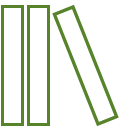 ELA Lens: Digital Literacy & Technology
ELA Lens: Digital Literacy & Technology
Digital literacy refers to the ability to use technology to find, evaluate, organize, create, and communicate information (MA DESE, 2019). Digital literacy goes above and beyond a focus on the mechanics of technology: it emphasizes the ability to use technology to achieve goals. Digital literacy empowers us to explore, to experiment, and to develop expertise; thus, effective ELA teachers provide adult learners with opportunities to use technology for these purposes as part of instruction.
When making curricular or instructional decisions, ask the following questions:
- Are ELA standards that are related to digital literacy included multiple times, ideally in every unit (as priority or secondary standards)?
- Do students not only read digital texts but also use digital tools to access texts and organize what they learn from them?
- Are students taught how to find—and evaluate the validity of—online sources? Are they given opportunity to practice doing so with different topics and for different tasks?
- Do students use digital tools to create and present products (e.g., papers, presentations, graphics)?
- Are there prompts and supports for teachers to teach the relevant pieces above?
- Is it likely that teachers will have access to the technological tools used across the curriculum?
Even if your teaching situation is in an unconnected or under-resourced classroom, or your adult learners do not all have access to the internet or to viable technology, you can still think about how to foster digital literacy skills.
"Digital literacy is more than technological know-how. It includes various ethical, social and reflective practices essential to developing online resilience and ethical digital citizenship." (Brisson-Boivin & McAleese, April 2021)
If teaching in a non-internet environment, as in most of Corrections, how might any of the tasks above be adapted or re-imagined for offline access? What skills and practices underpin digital literacy, that you can practice in different ways?
Tools and Resources
- ELA Proficiency Guide
- ACLS: Digital Literacy in Adult Education (includes "Digital Literacy: A Guide for Adult Education Programs")
- LINCS: Digital Literacy Initiatives
- Promoting Digital Literacy for Adult Learners: A Resource Guide
- Maryland Dept. of Labor: Digital Literacy Framework for Adult Learners
- Teaching Skills That Matter: Digital Literacy
 |
SABES ELA Curriculum Hub |
| SABES CCRSAE-ELA Hub | |
| SABES ELA Priority Lenses | |
| SABES ELA Home Page |


